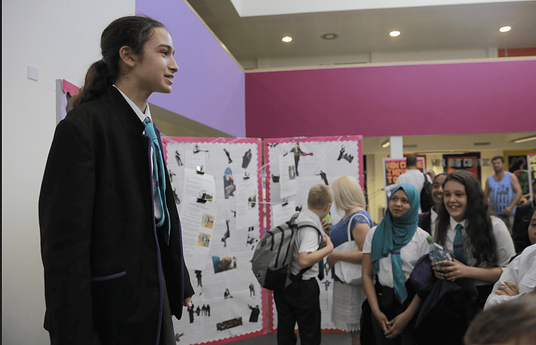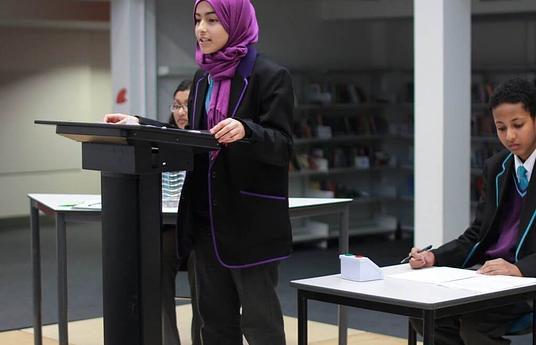Children spend an awful lot of time being silenced, hushed and cajoled into being quiet. While the old proverb ‘children should be seen and not heard’ is no longer common parlance, the essence lingers in the classroom to this day. Undeniably, it’s mind bendingly frustrating to stand at the front of class and strain to be heard. And it’s true, students must learn to listen respectfully to others and to practice skills for effective listening and learning. But with all the focus on keeping a classroom quiet, when do young people get a chance to practice the other integral part of communication – oracy?
The answer is, simply, they don’t. Recent research revealed that in the average UK classroom, a student’s contribution is a miserly 4 words per lesson. In a study entitled ‘A Generation Adrift’, The Communication Trust made the case for speech, language and communication to take a central role in education policy and practice.
The study noted that, “Often, lessons are dominated by teacher talk which rarely improves spoken language or enhances learning” and suggested that high quality classroom talk is key to improving spoken language skills. With the best intentions, teachers tend to dominate talk time in the classroom, often in the form of an initiate–respond–evaluate cycle, where the only time a student gets to talk is when giving an answer, meaning that opportunities to generate or develop ideas or critically engage with a topic are often missed.
Oracy is the development of children’s ability to use speech to express their thoughts, communicate with others throughout life and to learn effectively in school. The term was coined by Andrew Wilkinson in 1965, when he noticed that speaking and listening skills were being sidelined in favour of teaching literacy. Sadly, not much has changed since then. In fact, while oracy may appear in curricula in many forms, perhaps as ‘speaking and listening’, ‘spoken language’ or ‘communication skills’, wherever it appears, it’s likely to be obscured in the rather large shadow cast by the curriculum mammoths of reading and writing. But far from being supplementary, oracy is a skill that is as vital for learning as it is crucial for success outside or the school walls.
Speaking is a huge priority. It's one of the biggest indicators of success later in life.
"
Far more emphasis is put on mastering reading and writing, unarguably key skills for school and beyond. But spoken language comprises the bulk of human interaction and is a crucial part of socializing, relationship building and self expression. Most people have the ability to speak, but using spoken language effectively is undeniably a skill. It’s one that is learned and practised from when we are very small, and even as adults, many feel they lack in this area. Speak to most adults and they will tell you that just the idea of public speaking makes them quake in their boots. People spend good money to learn how to give a great presentation and self help shelves are littered with books promising to improve the ability to speak effectively, whether that’s at a party or in the board-room.
Clearly, like many human skills, the ability to use language well has to be learned. But not only does oracy remain largely untaught, speaking is frequently inhibited or discouraged in schools. It’s as if we collectively believe that children will spontaneously blossom into articulate, coherent, expressive communicators. But, oracy is a skill like any other and requires the training and practice we would dedicate to any other craft, like writing or playing music.
So, what is the case for oracy in school? Spoken language has been found to be essential to children’s learning and thinking and high quality talk is known to raise standards in core subjects. Neil Mercer, Professor of Education at Cambridge University, argues that oracy must play a fundamental part of education. He says: “Skills in oracy will be more important for most people when they leave school than, for example, skills in algebra. Yet I found it very hard to persuade the former Secretary of State for Education that ‘speaking and listening’ should remain in the National Primary Curriculum for English, and the oral language assessment component has been removed from GCSE English. There still seems to be an influential view that ‘talk’ does not need tuition, and that if children are talking they are not learning.”
He also implores schools to teach oracy for the sake of social equality. In childhood, spoken language forms the basis for development of literacy and a limited spoken vocabulary is related to poor written skills. Shockingly, children from low income families are exposed to 30 million fewer words than their higher-income peers before age 3 and the language gap only widens over the course of their school career. The effect this will have on their education and future life prospects doesn’t need to be speculated on. Opportunity to talk in the classroom is vitally important for all children, but particularly so for students being taught in a language different from the one they speak at home, as well as those from disadvantaged backgrounds who may have less talk time at home.
When young people aren’t given the opportunity to find their voice, the repercussions reach far beyond the classroom. Amy Gaunt, of Voice 21, explains: "Speaking is a huge priority. It's one of the biggest indicators of success later in life. It's important in terms of their employability as they get older. It's important in terms of wellbeing. If children aren't able to express themselves and communicate how they're feeling, they're not going to be able to be successful members of society."
Oracy is fundamental to working life, too. Effective spoken communication is obviously key to any role that demands public speaking, whether it’s delivering presentations, speeches, sales pitches or motivational team meetings. Oracy is also the lynchpin of team working, collective problem solving and ideation, vital skills in almost any career.
Yet despite the obvious importance of spoken language skills, schools are not teaching them effectively. In Britain, 88% of employers believe that school leavers are not prepared for the world of work, with 57% citing lack of soft skills including teamwork and the ability to communicate effectively. So while everyone can recognize the importance of oracy, this clearly does not translate to decisive action in schools.
Research conducted by Voice 21 found that while teachers understand that oracy is valuable to pupils’ development linguistically, socially and emotionally; “Teachers surprisingly do not tend to link oracy with pupils’ economic and employment prospects.” This is particularly shocking, given the importance placed by employers on the ability to communicate.
Why, given it’s vital importance, is oracy not a more major part of schooling? In a report entitled ‘The State Of Speaking In Our Schools’, Voice 21 identified key barriers to UK educators engaging with oracy in school. Barriers included; lack of time and the pressure to deliver other outcomes, the need to prioritize written work and the concern that with spoken work there would be ‘nothing to show’ for it, making it irrelevant to external examination. Confidence was another obstacle to oracy teaching, as teachers felt they lacked training in this area and they feared that under confident children would be made anxious by increased talk time in class. Whilst classes such as literacy, drama, citizenship and humanities seem to lend themselves effortlessly to the spoken word, teachers in other fields, like the sciences, may feel that their subject isn’t suited to oracy development.
Look around you and you’ll see living testaments to the power of oracy. In the wake of the tragic Florida School shooting, 17 year old Emma Gonzalez took to the stage to deliver a stormy speech calling for gun control.
"
Neil Mercer, of Cambridge University, remains hopeful that oracy can become a priority in education. He explains: “Through our own research and that of others, we know there are some very effective ways of teaching oracy skills, which are already used by some teachers. For example, one established way to make group-work more productive is to ask students to agree on a suitable set of ‘ground rules’ for how they will conduct their discussions.”
“When groups follow appropriate ground rules they are more likely to find good, creative solutions to problems. They learn how to use talk to get things done. And our research shows that when students learn how to use talk to reason together, they become better at reasoning on their own – and so improve their attainment in maths, science and other subjects.”
Other strategies to get kids talking include holding ‘no pen days’ or inviting students to present in assembly. Oracy can be embedded at policy level into the wider school culture, rather than teaching it as an isolated or sporadic component in literacy lessons. Educators can teach dedicated oracy lessons or choose to integrate speaking components into more lessons, not just literacy and foreign language teaching. Training can help to build teachers confidence in using speech effectively in the classroom, equip them with useful strategies and arm them with evidence that links high quality talk and academic rigour, to quash any fears around talk being a waste of time. Each school, each teacher and each student has unique needs when it comes to oracy teaching, the most important thing is that schools are taking steps towards putting talk at the heart of learning.
Look around you and you’ll see living testaments to the power of oracy. In the wake of the tragic Florida School shooting, 17 year old Emma Gonzalez took to the stage to deliver a stormy speech calling for gun control. Malala Yousafzai has spent years raising her voice for girl’s education. Indigenous climate activist Xiuhtezcatl Roske-Martinez at 15 years of age stood in the UN to speak on climate change, something he’s spoken publicly on since he was 6. You only have to look at TED talks to witness a whole host of inspirational orators that are making waves with the power of speech before even graduating from school.
Imagine the impact these individuals have on their classmates, their community and the wider world. Then imagine what the world would look like if every child had the skills to stand up and speak out for what they believe in. To advocate for themselves in school, in the workplace, in their private lives, in big ways and small. To express their ideas, beliefs and identities. Not everyone has to deliver speeches at the UN, but everyone should be empowered with the skills and confidence to articulate themselves, build relationships, learn effectively and speak their truth.
If you are looking for tried and tested ways of increasing oracy in your classroom, look no further than our Oracy Edit.



